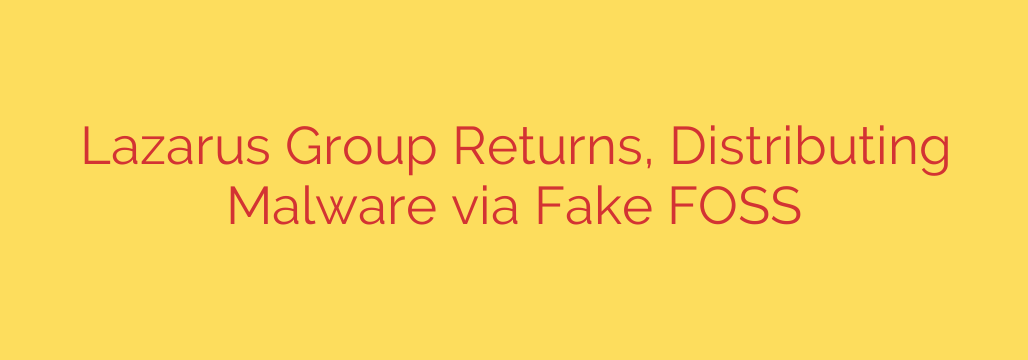
Warning: Lazarus Hackers Weaponize Open-Source Software in New Malware Campaign
A sophisticated and dangerous cyber campaign is underway, orchestrated by one of the world’s most infamous state-sponsored hacking collectives. The notorious Lazarus Group is actively targeting professionals in the tech and cryptocurrency sectors by distributing malicious versions of legitimate free and open-source software (FOSS). This tactic represents a significant evolution in their methods, leveraging the trust users place in popular, community-driven tools to gain initial access to sensitive networks.
This new campaign involves creating and distributing trojanized applications that perfectly mimic the appearance and functionality of well-known software. Hackers are impersonating tools that developers, system administrators, and crypto enthusiasts use daily. By doing so, they trick victims into downloading and running malware that paves the way for extensive network compromise, data theft, and financial loss.
A Deceptive and Targeted Attack Strategy
The attack chain is both clever and insidious. The Lazarus Group has been observed using social engineering, often through platforms like LinkedIn, to approach potential targets with convincing but fake job offers. Once a conversation is initiated, the target is lured to a website or repository that appears legitimate but is, in fact, controlled by the attackers.
On these fraudulent sites, victims are prompted to download a piece of required software for the “job interview” or project—for example, a custom SSH client, a code editor, or a cryptocurrency wallet manager. However, the downloaded file is a weaponized version of the real application.
Key points of this attack method include:
- Impersonation of Trusted FOSS: The malware is hidden within applications that users know and trust, lowering their defenses.
- Sophisticated Social Engineering: Attackers create credible personas and scenarios to manipulate their targets into taking specific actions.
- Gaining Initial Foothold: The primary goal of the trojanized software is to establish initial access to a target’s computer and, by extension, their corporate or personal network.
- Multi-Stage Malware: Once executed, the initial malware acts as a downloader, pulling more potent malicious payloads from a command-and-control server. This can lead to the deployment of ransomware, spyware, or tools designed for stealing cryptocurrency credentials.
Who is the Lazarus Group?
The Lazarus Group is a highly skilled cybercrime and cyber-espionage organization widely believed to be operated by and for the North Korean state. This group is not new to the scene; they have been linked to some of the most significant cyberattacks in recent history.
They are infamous for their role in the 2014 Sony Pictures hack, the 2016 SWIFT banking heist, and the devastating 2017 WannaCry ransomware attack that crippled organizations worldwide. In recent years, they have shifted a significant portion of their focus to the lucrative cryptocurrency industry, being responsible for the theft of billions of dollars from exchanges and individuals. Their persistence, resources, and continuous evolution of tactics make them a formidable threat.
Who Is at Risk?
While this campaign can affect anyone, the Lazarus Group is specifically targeting:
- Software Developers and IT Administrators: These individuals hold privileged access to critical infrastructure, making them high-value targets.
- Blockchain and Cryptocurrency Professionals: Due to the direct financial incentive, anyone working in Web3, DeFi, or for a cryptocurrency exchange is at extremely high risk.
- Financial Sector Employees: Professionals working in fintech and traditional finance remain a key focus for the group.
Essentially, if your role involves handling sensitive data, network credentials, or digital assets, you are a potential target.
Actionable Security Tips: How to Protect Yourself and Your Organization
Defending against such a sophisticated threat requires vigilance and adherence to security best practices. The trust we place in open-source software is being exploited, so it’s critical to verify everything.
Here are essential steps to stay secure:
Verify Your Download Sources: Never download software from an unverified source, link, or repository. Always go directly to the official project website or its official GitHub page. Be wary of links sent via email or direct message, even if they appear to come from a trusted contact.
Check File Hashes and Digital Signatures: Before running any downloaded executable, verify its integrity. Legitimate software projects often provide checksums (like SHA-256 hashes) that you can use to confirm your downloaded file has not been altered. For Windows applications, check the file properties for a valid digital signature from the correct developer.
Be Skeptical of Unsolicited Contact: Treat any unexpected job offer or project proposal with extreme caution, especially if it requires you to download specific, non-standard software. Verify the recruiter’s identity and the company’s legitimacy through official channels.
Employ Robust Endpoint Security: Ensure all devices are protected with a reputable next-generation antivirus (NGAV) and endpoint detection and response (EDR) solution. These tools can often detect and block the malicious behavior of trojanized applications, even if the file itself is new.
Educate Your Team: Security is a shared responsibility. Ensure your entire team understands the risks of social engineering and the importance of software verification. Regular security awareness training is crucial for building a human firewall against these attacks.
The weaponization of trusted open-source software marks a serious escalation in cyber warfare. The Lazarus Group has proven its ability to adapt and innovate, and this latest campaign is a stark reminder that no tool or platform is immune from being exploited. By maintaining a security-first mindset and practicing digital diligence, we can better defend against these persistent threats.
Source: https://go.theregister.com/feed/www.theregister.com/2025/08/04/infosec_in_brief/








